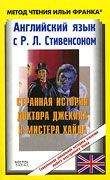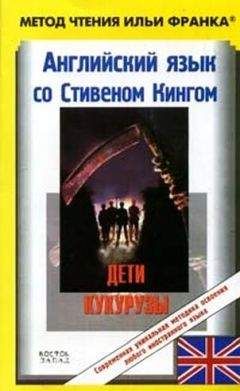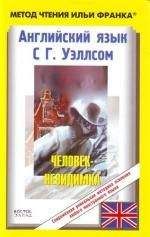primitive [ˈprɪmɪtɪv], worship [wə: ʃɪp], hewn [hju: n]
Soon he saw a dark mass take form out of the dimness ahead of him. He went forward even more warily than before, sword in hand and eyes searching the hazy immensities of this domain. The moonlight was still brilliant, but its radiance became obscure with distance as if veiled by some thickening haze. So, at first, Conan could make nothing of the black, featureless mass that lifted out of the plain before him, save for its size and its stillness. Like some colossal Idol of primitive devil worship, hewn from a mountain of black stone by some unknown being in time's dawn, the dark mass squatted motionless amid the dead gray grass.
As Conan came nearer, details emerged from the dark, featureless blur (когда Конан подошел ближе, подробности возникли из темных неясных очертаний; blur — клякса, расплывшееся пятно; неясные очертания). He saw that it was a tremendous edifice, which lay partly in ruins on the plains of Kush (он увидел, что это было огромное сооружение, которое лежало частично в руинах на равнинах Куша) — a colossal structure erected by unknown hands for some nameless purpose (колоссальное строение, воздвигнутое неизвестными руками для какой-то неясной цели). It looked like a castle or fortress of some sort, but of an architectural type that Conan had never seen (оно выглядело как / было похоже на замок или крепость некоего вида, но архитектурного типа, который Конан никогда /не/ видел; to look like — походить на, быть похожим на). Made of dense black stone (сделанное из плотного черного камня), it rose in a complex facade of pillars and terraces and battlements (оно поднималось составным фасадом из колонн и террас и стен с бойницами), whose alignment seemed oddly awry (чья выравненность казалась странно деформированной; awry — кривой, искаженный). It baffled the view (это поражало: «поражало, сбивало с толку видение»). The eye followed mind-twisting curves that seemed subtly wrong, weirdly distorted (глаз следовал за головокружительными изгибами, которые казались неуловимо неправильными, странно искаженными; mind — разум; to twist — крутить, сплетать(ся)). The huge structure gave the impression of a chaotic lack of order, as if its builders had not been quite sane (огромное строение давало впечатление хаотического отсутствия порядка, словно его строители были не совсем в своем уме; sane — здоровый психически, в своем уме).
castle [kɑ: sl], fortress [ˈfɔ: trɪs], awry [əˈraɪ]
As Conan came nearer, details emerged from the dark, featureless blur. He saw that it was a tremendous edifice, which lay partly in ruins on the plains of Kush — a colossal structure erected by unknown hands for some nameless purpose. It looked like a castle or fortress of some sort, but of an architectural type that Conan had never seen. Made of dense black stone, it rose in a complex facade of pillars and terraces and battlements, whose alignment seemed oddly awry. It baffled the view. The eye followed mind-twisting curves that seemed subtly wrong, weirdly distorted. The huge structure gave the impression of я chaotic lack of order, as if its builders had not been quite sane.
Conan wrenched his gaze from the vertiginous curves of this misshapen mass of masonry, merely to look upon which made him dizzy (Конан оторвал /свой/ взгляд от головокружительных изгибов этой уродливой глыбы /искусства/ каменной кладки, лишь смотреть = взгляд на которую вызывал /у/ него головокружение$ mason — каменщик). He thought he could at last perceive why the beasts of the veldt avoided this crumbling pile (он подумал, /что/ /он/ мог наконец понять, почему звери степи избегали этой осыпающейся громады; pile — куча, груда, штабель; огромное здание). It somehow exuded an aura of menace and horror (она как-то испускала ауру угрозы и ужаса). Perhaps, during the millennia that the black citadel had squatted on the plains (возможно, в течение тысячелетий, которые черная цитадель простояла на равнинах), the animals had come to dread it and to avoid its shadowy precincts (животные пришли = стали бояться ее и избегать ее туманных пределов), until such habits of avoidance were now instinctive (пока такие привычки избеганий = избегать ее /не/ были = стали теперь инстинктивными).
aura [ˈɔ: rə], menace [ˈmenəs], avoid [əˈvɔɪd]
Conan wrenched his gaze from the vertiginous curves of this misshapen mass of masonry, merely to look upon which made him dizzy. He thought he could at last perceive why the beasts of the veldt avoided this crumbling pile. It somehow exuded an aura of menace and horror. Perhaps, during the millennia that the black citadel had squatted on the plains, the animals had come to dread it and to avoid its shadowy precincts, until such habits of avoidance were now instinctive.
The moon dimmed suddenly as high-piled storm clouds again darkened her ageless face (луна потускнела вдруг, когда многоярусные грозовые тучи снова затемнили ее вечный лик). Distant thunder grumbled (загрохотал далекий гром), and Conan's searching gaze caught the sulphurous flicker of lightning among the boiling masses of cloud (и ищущий взгляд Конана уловил зеленовато-желтое мерцание света среди вскипающих масс туч). One of those quick, tempestuous thunderstorms of the savanna was about to break (одна из тех быстрых, бурных гроз саванны была готова разразиться; to be about — собираться, намереваться, быть готовым; tempest — буря).
sulphurous [ˈsʌlfərəs], quick [kwɪk], savanna [səˈvænə]
The moon dimmed suddenly as high-piled storm clouds again darkened her ageless face. Distant thunder grumbled, and Conan's searching gaze caught the sulphurous flicker of lightning among the boiling masses of cloud. One of those quick, tempestuous thunderstorms of the savanna was about to break.
Conan hesitated (Конан заколебался). On the one hand, curiosity and a desire for shelter from the coming storm drew him to the crumbled stronghold (с одной стороны любопытство и желание убежища от приближающейся грозы тянуло его к разрушенной твердыне). On the other, his barbarian's mind held a deep- rooted aversion to the supernatural (с другой /стороны/ его варварский ум держал = испытывал глубоко укоренившееся отвращение к сверхъестественному). Toward earthly, mortal dangers he was fearless to the point of rashness (к земным, смертельным опасностям он был бесстрашен до точки = пределов безрассудства; fear — страх), but otherworldly perils could send the tendrils of panic quivering along his nerves (но потусторонние опасности могли послать ощущения / выбросить усики[20] паники, вызывающей дрожь вдоль/по его нервам). And something about this mysterious structure hinted at the supernatural (а что-то в этом таинственном сооружении наводило мысль на сверхъестественное; to hint at — намекать на, наводить мысль на). He could feel its menace in the deepest layers of his consciousness (он мог ощущать его угрозу в самых глубоких слоях = уголках его сознания; conscious — сознательный, сознающий).
other [ˈʌðə], aversion [əˈvə: ʃn], panic [ˈpænɪk]
Conan hesitated. On the one hand, curiosity and a desire for shelter from the coming storm drew him to the crumbled stronghold. On the other, his barbarian's mind held a deep-rooted aversion to the supernatural. Toward earthly, mortal dangers he was fearless to the point of rashness, but otherworldly perils could send the tendrils of panic quivering along his nerves. And something about this mysterious structure hinted at the supernatural. He could feel its menace in the deepest layers of his consciousness.
A louder rumble of thunder decided him (более громкий грохот грома заставил его решиться). Taking an iron grip on his nerves, he strode confidently into the dark portal (взявшись железной хваткой за = обуздав железной хваткой свои нервы, он прошагал уверенно в темный портал; to stride — шагать (большими шагами)), naked steel in hand (с голой сталью = со сталью наголо в руке), and vanished within (и исчез внутри).
thunder [ˈƟʌndə], grip [ɡrɪp], steel [sti: l]
A louder rumble of thunder decided him. Taking an iron grip on his nerves, he strode confidently into the dark portal, naked steel in hand, and vanished within.
4. The Serpent Men
(Люди-змеи)
Conan prowled the length of the high-vaulted hall, finding nothing that lived (Конан проверил протяженность зала с высоким сводом, /не/ найдя ничего живого: «что жило»). Dust and dead leaves littered the black pave (пыль и мертвые листья засорили черную плитку). Moldering rubbish was heaped in the corners and around the bases of towering stone columns (тлеющий мусор накопился в углах и вокруг оснований возвышающихся каменных колонн; heap — груда, куча, масса; to heap — бросать в кучу, складывать в кучу, нагромождать). However old this pile of masonry was, evidently no living thing had dwelt therein for centuries (как бы стара ни была эта громада из камня, очевидно, ни одно живое существо /не/ жило там для = на протяжении веков; to dwell — жить, обитать).
hall [hɔ: l], dust [dʌst], centuries [ˈsentʃərɪz]
Conan prowled the length of the high-vaulted hall, finding nothing that lived. Dust and dead leaves littered the black pave. Moldering rubbish was heaped in the corners and around the bases of towering stone columns. However old this pile of masonry was, evidently no living thing had dwelt therein for centuries.
The hall, revealed by another brief appearance of the moon, was two stories high (зал, показанный еще одним кратким появлением луны, был высотой в два этажа: «два этажа высокий»). A ballustradеd balcony ran around the second floor (балкон с баллюстрадой протянулся вокруг второго этажа; to run — бежать; тянуться). Curious to probe deeper into the mystery of this enigmatic structure (любопытный = горящий любопытством исследовать поглубже тайну этого загадочного строения) which squatted here on the plain many leagues from any other stone building (которое расположилось здесь на равнине /за/ много лиг от любого другого каменного здания), Conan roamed the corridors, which wound as sinuously as a serpent's track (Конан бродил /по/ коридорам, которые вились так извилисто, как змеиный след; to wind — виться, извиваться). He poked into dusty chambers whose original purpose he could not even guess (он совался в пыльные комнаты, первоначальное назначение которых он даже не мог угадать; whose — чье, чей, чья, чьи, которого, которой, которых; dust — пыль).
floor [flɔ: ], probe [prəub], guess [ɡes]
The hall, revealed by another brief appearance of the moon, was two stories high. A ballustradcd balcony ran around the second floor. Curious to probe deeper into the mystery of this enigmatic structure which squatted here on the plain many leagues from any other stone building, Conan roamed the corridors, which wound as sinuously as a serpent's track. He poked into dusty chambers whose original purpose he could not even guess.
The castle was of staggering size (замок был потрясающего размера), even to one who had seen the temple of the spider-god at Yezud in Zamora and the palace of King Yildiz at Aghrapur in Turan (даже для того: «одного», кто видел храм бога-паука в Йезуде, в Заморе, и дворец короля Илдиза в Аграпуре, в Туране). A good part of it — one whole wing, in fact (большая часть его — одно целое крыло фактически) — had fallen into a featureless mass of tumbled black blocks (рухнуло бесформенной глыбой из обрушенных черных блоков), but the part that remained more or less intact was still the largest building that Conan had seen (но часть, которая оставалсь более-менее нетронутой, была еще самым большим зданием, которое Конан видел). Its antiquity was beyond guessing (его древность была за пределами догадок = о его древности было невозможно догадаться). The black onyx of which it was wrought was unlike any stone that Conan had seen in this part of the world (черный оникс, из которого он был изваян, был непохож /на/ любой камень, который Конан видел в этой части света; wrought — архаичная форма прошедшего времени и причастия прошедшего времени от to work — обрабатывать; ваять, высекать; строить). It must have been brought across immense distances — why, Conan could not imagine (его, должно быть, привезли через огромные пространства — зачем, Конан не мог представить/вообразить).





